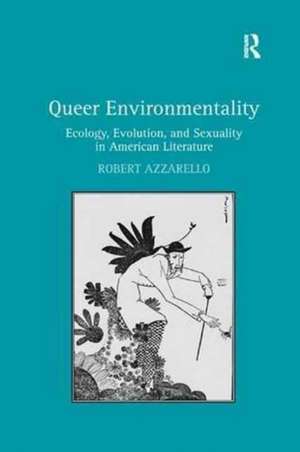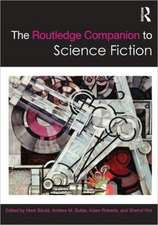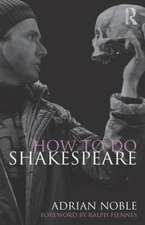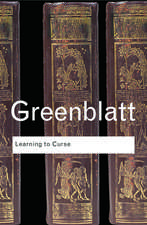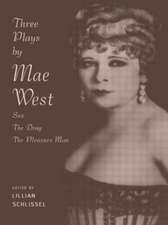Queer Environmentality: Ecology, Evolution, and Sexuality in American Literature
Autor Robert Azzarelloen Limba Engleză Paperback – 17 noi 2016
| Toate formatele și edițiile | Preț | Express |
|---|---|---|
| Paperback (1) | 408.03 lei 43-57 zile | |
| Taylor & Francis – 17 noi 2016 | 408.03 lei 43-57 zile | |
| Hardback (1) | 1109.18 lei 43-57 zile | |
| Taylor & Francis – 28 mar 2012 | 1109.18 lei 43-57 zile |
Preț: 408.03 lei
Nou
Puncte Express: 612
Preț estimativ în valută:
78.08€ • 81.72$ • 64.98£
78.08€ • 81.72$ • 64.98£
Carte tipărită la comandă
Livrare economică 31 martie-14 aprilie
Preluare comenzi: 021 569.72.76
Specificații
ISBN-13: 9781138268647
ISBN-10: 113826864X
Pagini: 168
Dimensiuni: 156 x 234 x 14 mm
Greutate: 0.26 kg
Ediția:1
Editura: Taylor & Francis
Colecția Routledge
Locul publicării:Oxford, United Kingdom
ISBN-10: 113826864X
Pagini: 168
Dimensiuni: 156 x 234 x 14 mm
Greutate: 0.26 kg
Ediția:1
Editura: Taylor & Francis
Colecția Routledge
Locul publicării:Oxford, United Kingdom
Notă biografică
Robert Azzarello is Assistant Professor of English at Southern University at New Orleans, USA.
Recenzii
'In Queer Environmentality, Robert Azzarello combines an environmental/evolutionary emphasis with selected elements of queer theory to re-situate texts by Thoreau, Melville, Cather and Barnes, and the resulting readings are dazzling. In a nuanced and sophisticated analysis, he demonstrates not only the ethical and aesthetic potentials of queer environmentality, but also its historical roots in texts considered canonical to ecocritical and queer scholarship.' --Catriona Sandilands, York University
'The book will be useful to anyone working in the emerging field of queer ecology. Lengthily assessing longstanding conflicts between eco-critics and practitioners of queer studies, Azzarello situates them in the philosophical debate between constructivism and objectivism... Azzarello’s book rightly springs from questions about the relationship between knowing, being, and ethics, and we will surely see such questions re-examined many times as the field beings to develop.' --NBOL-19
'Queer Environmentality is a stimulating example of queer ecocritical scholarship and a provocative starting point for future work.' --Interdisciplinary Studies in Literature and Environment
'Queer Environmentality is an openly theoretical book that is carefully argued, and it will likely find a ready audience among ecocritics interested in the type of questions that it raises.' American Studies
'Azzarello works to justify queer environmentality as its own epistemology. While Azzarello does not need to convince me of the value of queer ecocritical readings, I am pleased to note that the rigor and thoroughness, both philosophical and critical, present in Queer Environmentality does its work to help legitimize this approach. Azzarello’s declaration that [q]ueering is not a rejection, but a layering, a dramatization of exception offers a view of the hopeful openness through which queer ecology functions.' --Ecozon@
'Azzarello's Queer Environmentality is outstanding scholarship centered on queer ecology and queer ecocriticism." --Keitaro Morita, Comparative Literature and Culture
'A sustained, sophisticated consideration of the rationale for queer ecocriticism.' –Greg Garrard, University of British Columbia, Modern Language Review
'Queer Environmentality is a sophisticated analysis of selected American texts, within a theoretical context that may begin with Darwin's contribution to evolutionary and environmental theories but goes well beyond him into contemporary theory, including ecofeminism, queer theory and post-humanism.' --American Studies Today Online
'The book will be useful to anyone working in the emerging field of queer ecology. Lengthily assessing longstanding conflicts between eco-critics and practitioners of queer studies, Azzarello situates them in the philosophical debate between constructivism and objectivism... Azzarello’s book rightly springs from questions about the relationship between knowing, being, and ethics, and we will surely see such questions re-examined many times as the field beings to develop.' --NBOL-19
'Queer Environmentality is a stimulating example of queer ecocritical scholarship and a provocative starting point for future work.' --Interdisciplinary Studies in Literature and Environment
'Queer Environmentality is an openly theoretical book that is carefully argued, and it will likely find a ready audience among ecocritics interested in the type of questions that it raises.' American Studies
'Azzarello works to justify queer environmentality as its own epistemology. While Azzarello does not need to convince me of the value of queer ecocritical readings, I am pleased to note that the rigor and thoroughness, both philosophical and critical, present in Queer Environmentality does its work to help legitimize this approach. Azzarello’s declaration that [q]ueering is not a rejection, but a layering, a dramatization of exception offers a view of the hopeful openness through which queer ecology functions.' --Ecozon@
'Azzarello's Queer Environmentality is outstanding scholarship centered on queer ecology and queer ecocriticism." --Keitaro Morita, Comparative Literature and Culture
'A sustained, sophisticated consideration of the rationale for queer ecocriticism.' –Greg Garrard, University of British Columbia, Modern Language Review
'Queer Environmentality is a sophisticated analysis of selected American texts, within a theoretical context that may begin with Darwin's contribution to evolutionary and environmental theories but goes well beyond him into contemporary theory, including ecofeminism, queer theory and post-humanism.' --American Studies Today Online
Cuprins
Nature and Its Discontents; Thoreau’s Queer Environmentality; Melville’s Apples of Sodom; Cather’s Onto-Theology of Oikos; Barnes’s Queerly Nietzschean Nature; The Philosophical Upshot;
Descriere
Offering a model for meaningful dialogue between queer and environmental studies, Azzarello's book traces a queer-environmental lineage in American Romantic and post-Romantic literature. Azzarello's study treats four American authors-Henry David Thoreau, Herman Melville, Willa Cather and Djuna Barnes-all of whom problematize conventional notions of the matrix between the human, the natural and the sexual and challenge the assumption that the subject of American environmental literature is essentially heterosexual.
